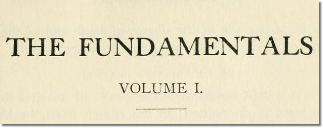Roger Olson: Why I Wrote ‘Against Liberal Theology’
Body
“What most people don’t know is that liberal theology is a tradition; it is not just any type of theology that a person disagrees with because it seems too revisionist.” - Roger Olson
Discussion
What Are the Fundamental Doctrines of the Faith?
Body
“The historic five fundamentals remain an important aspect of fundamentalism’s history and heritage, though they are not exclusive identifying marks of the movement.” - P&D
Discussion
Coming Soon: Christianity and Liberalism, 100th Anniversary Edition
Body
“Ligonier’s one-hundredth anniversary edition of [J. Gresham Machen’s] classic book, Christianity and Liberalism, shows a new generation that God’s message of salvation is timeless.” - Ligonier
Discussion
Shall the Fundamentalists Win? (Part 2)
Read the first installment.
Harry Fosick continues his 1922 sermon against fundamentalism.1 For clarity, headings have been added to the text.
Discussion
Shall the Fundamentalists Win? (Part 1)
In this landmark 1922 sermon, Harry E. Fosdick, Pastor of First Presbyterian Church in New York, called for an open-minded, “tolerant” view of Christian fellowship. He delivered this address in the midst of the Fundamentalist-Modernist controversy. As is plain from his sermon, he did not want the fundamentalists to win!1
Discussion
"The Abolition of Man" at Age Seventy-Five
Body
“Since its initial publication seventy-five years ago, The Abolition of Man has served as one of the finest non-reactionary bulwarks against the faddish ideologies and various subjectivisms and other nihilistic nonsense of the political and cultural Left.” - Intellectual Takeout
Discussion
New Book: "The Making of a Battle Royal" by Jeff Straub
Body
“Baptist bodies had a new enemy—theological liberalism … Soon these ideas were being presented at denominational gatherings or published in denomination papers and books … By 1920, the Northern Baptists, in particular, broke out into an all-out war over theology that came to be called ‘The Fundamentalist-Modernist’ controversy.
Discussion
The History of the Higher Criticism
 [node:22019 collapsed body]
[node:22019 collapsed body]
CHAPTER VI. THE HISTORY OF THE HIGHER CRITICISM.
BY CANON DYSON HAGUE, M. A., RECTOR OF THE MEMORIAL CHURCH, LONDON, ONTARIO. LECTURER IN LITURGICS AND ECCLESIOLOGY, WYCLIFFE COLLEGE, TORONTO, CANADA. EXAMINING CHAPLAIN TO THE BISHOP OF HURON.
What is the meaning of the Higher Criticism? Why is it called higher? Higher than what?
At the outset it must be explained that the word “Higher” is an academic term, used in this connection in a purely special or technical sense. It is not used in the popular sense of the word at all, and may convey a wrong impression to the ordinary man. Nor is it meant to convey the idea of superiority. It is simply a term of contrast. It is used in contrast to the phrase, “Lower Criticism.”
One of the most important branches of theology is called the science of Biblical criticism, which has for its object the study of the history and contents, and origins and purposes, of the various books of the Bible. In the early stages of the science Biblical criticism was devoted to two great branches, the Lower, and the Higher. The Lower Criticism was employed to designate the study of the text of the Scripture, and included the investigation of the manuscripts, and the different readings in the various versions and codices and manuscripts in order that we may be sure we have the original words as they were written by the Divinely inspired writers. (See Briggs, Hex., page 1.) The term generally used now-a-days is Textual Criticism. If the phrase were used in the twentieth century sense, Beza, Erasmus, Bengel, Griesbach, Lachmann, Tregelles, Tischendorff, Scrivener, Westcott, and



Discussion